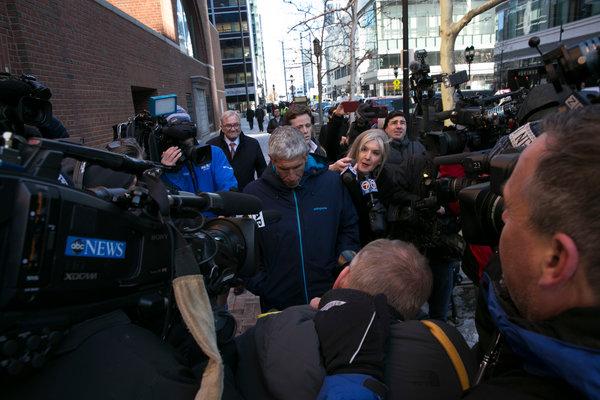Federal prosecutors on Tuesday charged 50 people in a brazen scheme to secure spots at Yale, Stanford and other big-name schools in what they called the “largest college admissions scam ever prosecuted by the Department of Justice.” They have accused dozens of parents of paying millions of dollars in bribes to help their children get into the schools.
For those catching up, or those overwhelmed by the volume of news, here’s an overview of The New York Times’s coverage.
Who was charged in the scandal?
-
The ringleader, William Singer: The 59-year-old businessman from Newport Beach, Calif., was the founder of a college preparatory business, the Edge College & Career Network, and its charity arm, the Key Worldwide Foundation. He had been working with federal investigators since September.
-
Thirty-three parents, many of them high-profile: The parents included the television star Lori Loughlin and her husband, the fashion designer Mossimo Giannulli; the actress Felicity Huffman; and William E. McGlashan Jr., a partner at the private equity firm TPG.
-
College athletic coaches: They were accused of accepting millions of dollars to help admit undeserving students to a wide variety of colleges, from the University of Texas at Austin to Wake Forest and Georgetown, by suggesting they were top athletes.

William Singer outside federal court in Boston on Tuesday.CreditKatherine Taylor for The New York Times
How did the scheme work?
The system operated by falsifying a student’s test scores or fabricating their athletic status. Here’s how the authorities say it worked:
-
Parents paid for scores: According to prosecutors, parents paid between $15,000 and $75,000 for higher test scores. Mr. Singer encouraged some parents to get a learning disability waiver for their children, which can give students more time to take the tests or allow them do so without the regular supervision.
-
The cheating went down in three ways: Someone else would take the SAT or ACT exams for the student; a person in on the scheme would serve as the proctor and guide the students to the right answers; or someone would review and correct the students’ answers after the tests were taken. Many students were not aware their answers would be changed, prosecutors said.
-
Sports opened a back door to elite colleges: University coaches and administrators were paid to secure admission for students who may not have even played the sport.
-
Athletic achievements and images were doctored: Students’ faces were photoshopped onto athletes’ bodies and bogus achievements were added to their college applications.
-
It was all under wraps: The parents made payments to Mr. Singer’s company that were disguised as donations and would be funneled through the organization to the universities, allowing the parents to claim tax deductions.
-
Read more about how the scheme worked, from bribes to doctored photos.
What’s the fallout?
-
Mr. Singer has pleaded guilty: He pleaded guilty to counts of racketeering conspiracy, money laundering conspiracy, conspiracy to defraud the United States, and obstruction of justice in federal court in Boston on Tuesday. The judge set sentencing for June 19, and Mr. Singer was released on a $500,000 bond.
-
No charges for students: Federal prosecutors have not charged any students or universities with wrongdoing, saying that many students were not aware of what their parents were up to. But Ms. Loughlin’s daughter, Olivia Jade Giannulli, a social media influencer with close to two million YouTube subscribers, is drawing scrutiny for her paid posts about college life.
-
The parents are facing charges: Many parents were charged with conspiracy to commit mail fraud and honest services mail fraud. If they are convicted, their sentences would most likely be determined in part by how much they paid. For instance, parents who paid $75,000 could get 12 to 18 months in prison, while those who paid $500,000 could get 30 to 37 months, according to Courtney Oliva, a researcher at the New York University School of Law. If the parents plead guilty, the sentences could be somewhat shorter.
-
Coaches are facing the consequences: The sailing coach at Stanford was fired. The U.C.L.A. men’s soccer coach was placed on leave, as was the Wake Forest women’s volleyball coach, and the men’s tennis coach at the University of Texas. Other coaches have also faced disciplinary action.
-
Students are suing: Two Stanford University students brought a class-action complaint in a federal court in California, accusing college after college of negligence. The students say they wasted their money applying to schools — in their cases, Yale and the University of Southern California — that turned them down but admitted applicants who benefited from the fraud, and that every “qualified, rejected” student had also been hurt. They also assert that the scandal has damaged the value of the Stanford degrees they anticipate earning. A spokesman for Stanford said the university was reviewing the lawsuit.
-
Businesses have responded: Mr. McGlashan was placed on indefinite leave by the private equity firm TPG on Wednesday. Another parent, Gordon Caplan, co-chairman of the global law firm Willkie Farr & Gallagher, was placed on a leave of absence and his management responsibilities were stripped. Doug Hodge, the retired chief executive of Pimco, one of the world’s biggest bond fund managers, was removed from an investment firm’s website.
-
Read more about some titans of finance and law who have been swept up in the scandal.

Listen to ‘The Daily’: Bribing Their Way Into College
A major college admissions scandal has laid bare the price of entry for some wealthy families — and the cost for everyone else.
What does this scandal reveal about racial disparities?
-
For nonwhite students, it was a reminder that nothing is equal about America’s college admissions process. “We can put in work from fifth grade to 12th grade, every single day, come in early, leave late, and it’s still not enough,” said Khiana Jackson, 17, a senior at Kauffman who has been accepted to the University of Chicago.
-
Some students were galled by the money being thrown around in the allegations. “I was mad at the fact that parents spent millions of dollars to pay these counselors to falsify test reports and in the meanwhile, I know everyone in here is figuring out how to come up with hundreds of thousands of dollars to pay for the rest of our college education,” said Jacob Esquivel, 18, who plans to attend the University of Miami.
-
Read more about how the case has served as another harsh lesson in racial disparities.
Hasn’t there always been a back door for the rich?
-
Private college consulting is “almost like the wild West”: From $300 consultations to $1.5 million full-service packages, most private college consulting is legal — but almost totally unregulated.
-
It’s gotten harder, even for the rich: It can cost $10 million or more in donations to earn an applicant truly special consideration beyond their merits, according to several experienced college admissions consultants.
-
Read more about the shadowy world of high-priced college consultants.







